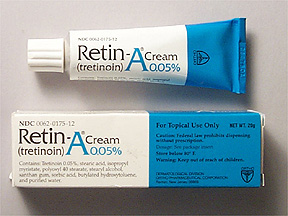You may have heard about Retin-A. Retin-A is a topical medical treatment for skin that helps skin to renew itself. Retin-A is a form of vitamin A, and may also be called Refissa or Tretinoin. Retin-A can be used to treat acne, and because of this, Retin-A helps promote healing on the skin. Retin-A is not to be confused with retinol, and we describe the differences between Retin-A and retinol in this blog post.
The wonderful thing about Retin-A products is they actually work. You may know that some anti-aging creams offered over the counter include diluted amounts of Retin-A. Retin-A can actually help to reduce the look of fine lines and wrinkles. It can also help lighten and reduce the look of aging spots and hyperpigmentation, and can help with rough spots of skin. The best thing about Retin-A is that it works on all skin types, and can help with persistent acne and an oily face.
Retin-A has been around for over 20 years, originally discovered as a treatment for acne. People have been using Retin-A for years to reduce acne, and have realized its benefits for a youthful appearance. The New York Times published an article in 2006 detailing how well Retin-A works.
How does it work?
Retin-A works by treating your skin directly, rather than trying to clear it of blackheads or whiteheads. Retin-A helps the skin adjust to fluctuations in hormones such as estrogen and testosterone, and also helps to curb the amount of sebum — an oily, waxy substance produced by your skin — that your skin is creating. When starting on Retin-A, it’s important to know that your skin may worsen before it gets better. If you can stick it out past the bad, the results are clearly worth it.
What else should I know?
When using Retin-A (tretinoin), you should always use sunscreen while out in the sun. Tretinoin can make your skin more susceptible to sun damage, as your skin may be more sensitive. You should also not apply it if you’re already sun burned.
If you are pregnant or planning to become pregnant, you should not use Retin-A. For other symptoms and side effects, you should contact us and discuss whether Retin-A is right for you.
Retin-A does not “reverse the aging process”, though it can provide visible results that you would be satisfied with. Don’t just believe us, though. Check out LoveTypeThing.com and their review of Retin-A and BeautyEditor.ca’s review of Retin-A. These articles include some great before and after photos.
Ready to see if Retin-A is right for you? Contact Abington Aesthetic & Laser Medical Center today!
